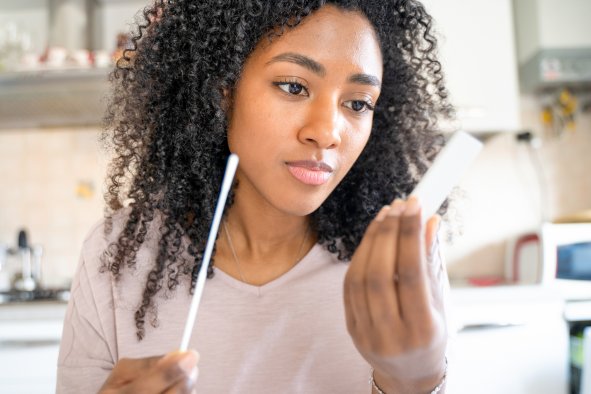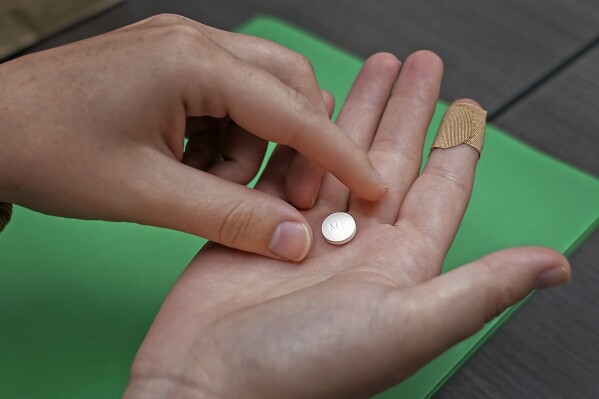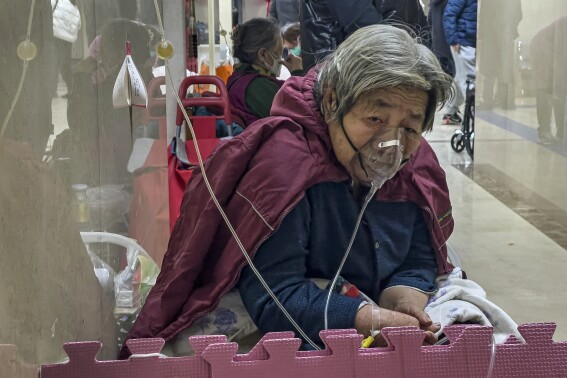For a moment each morning, I’d be blissfully unaware. Then the anxiety would hit, my heart racing and mind spinning about the day ahead. Half of me knew it was irrational. Yet I couldn’t shake the physical feeling of overwhelm – often so strong I’d be in tears even before I got out of bed. Why was I always running late, catching up, rushing, weighed down by deadlines, meetings and guilt.
Then came the hot flushes at night. My husband recalls me “erupting without warning”, like a hot, sweaty volcano at 3am, the intense heat waking him up as well. He would lovingly throw the duvet off me or move to the spare room. It wasn’t conducive to our love life, but I didn’t really fancy sex much anyway.
It was shortly before my 47th birthday when I made my first trip to the doctor to describe this, and was prescribed the antidepressant, sertraline. It helped and I am not ashamed to say it still plays a part in my life. But other symptoms persisted, bouts of insomnia which only melatonin (which I stocked up on every time I went to the United States) helped.
There was brain fog too. An urgent thing on my mind one second would vanish into thin air the next. The name of a colleague, something the children needed for school – poof! Gone. The brain fog sent me back to my GP, this time equipped with an invaluable piece of advice, which came from a chat with the sports presenter Gabby Logan, who made the ground-breaking assumption that, perhaps, as I could confidently list a number of the symptoms she had also experienced at a similar age, I could be perimenopausal. I feel rather foolish to admit, it was a penny-dropping moment.
At the time, I was the editor-in-chief of Hello! magazine, a position I had held for many years. I had even spearheaded the Menopause Workplace Pledge campaign with the charity Wellbeing of Women, to see women suffering with menopause symptoms better supported by employers. I hugged Gabby, and had a private cry – another thing happening regularly – because I finally felt validated.
Gabby recommended I ask for an appointment with my surgery’s resident menopause expert, another brilliant piece of advice, and when I arrived clutching my list of symptoms, I was determined not to leave without a prescription for HRT. As a keen supporter of Menopause Mandate, an organisation founded by Mariella Frostrup to revolutionise the support and advice women receive about this time of life, I had been in many rooms, including in Parliament, raising the profile of HRT with menopause campaigners such as Davina McCall, Lisa Snowdon and Carolyn Harris MP. It surprised me that no blood tests were taken by my GP to check my hormone levels, but I smiled all the way to Boots to claim my Oestrogel pump and progesterone tablets, for which, in April 2023, the UK government introduced the HRT pre-payment certificate: £19.80 for 12 months of prescriptions.
For a number of months, it appeared to work. My brain fog lifted and night sweats eased. Buoyed by HRT, I decided to phase out sertraline, dropping from one 50mg tablet a day, to half, to none at all over a period of weeks. This was a big mistake for me.
Before long, my old friends anxiety and overwhelm returned with a vengeance, as did the heart-racing sensation in the morning, the feeling I couldn’t cope at work, the wanting to burst into tears all the time. It came to a head one day in October 2023, which I have written about in detail in this paper before, when I crumpled into a sobbing heap after a work event. Something wasn’t right. I felt like resigning.
It’s no wonder. With perimenopause symptoms, focusing on work can be incredibly hard. The Menopause and the Workplace report by the Fawcett Society and Channel 4, which polled 4,000 women aged 45-55, found that one in 10 women have left work because of symptoms of the menopause. This is equivalent to 333,000 women if extrapolated across the UK.
Why I abandoned HRT
Hormone replacement therapy (HRT) didn’t seem to be a magic fix solving everything, so the doctor suggested I go back on sertraline straight away. It lessened the sensation of overwhelm again and I quickly felt more positive. In an effort not to become another statistic and leave my career, and supported by my employer, I turned to coaching to support this new life chapter in which I seemed to have unwittingly arrived.
Having experienced some one-to-one executive coaching in the past, I knew I loved the language of coaching – how it fosters a growth mindset, a coach’s job being to aid clients unlock their potential. This time, harbouring a strong urge to learn again, I decided to train to be one. The self-awareness gained on the course was life-changing for me. I began to embrace moving into the next instalment of my life – both physically and mentally. Coaching gave me new tools to navigate it, as well as the confidence to leverage wisdom gained from the first half of my working life for greater meaning and accomplishment in the second. I am now a qualified life coach, having completed a diploma at Optimus Coach Academy last year.
How I overcame hormonal acne
But I was experiencing another unexpected side effect of HRT – hormonal acne appeared in clusters on my face. As soon as one patch of spots on my cheek cleared up, another popped up on my chin, then another on my forehead. I hadn’t experienced anything like this as a teenager, so why now? Issues with skin can be another common sign of perimenopause, with hormonal fluctuations often leading to acne. Research shows even if you are taking HRT to replace oestrogen in your body, you may still have to deal with unpleasant pimples because HRT floods your body with progestin which can also upset your skin. The spots began to affect my confidence and, for the first time in decades, I felt self-conscious about my appearance when presenting in front of people. So with this, coupled with the fact that HRT alone didn’t seem to tackle my feelings of anxiety, after a further discussion with my GP, we decided to pause HRT to see if things improved.
My skin issues resolved quickly, boosted by a daily shot of Gold Collagen Forte Ageless – a powerful liquid blend of 12,000mg of hydrolysed marine collagen, which is also loved by the supermodel Yasmin le Bon. Plus, a nightly Serum-in-a-Cream personalised by And Begin, the midlife skin experts: mine contains tretinoin, an ingredient that works by accelerating the skin’s natural cell turnover process and has anti-acne properties, helping to prevent clogged pores and reducing inflammation.
What I did to beat stomach bloat
I decided to turn to other formulations to help combat my other menopause symptoms and, after being introduced to Jo Lyall, the nutritionist and founder of the Better Menopause, she suggested I start with my gut. “Research shows that changes to the gut microbiome have been linked to common menopause symptoms including hot flushes, anxiety, bloating, sleep disturbance, weight gain, brain fog and joint pain,” Jo explains. “The gut is responsible for the processing of hormones, which means it can affect both the production and the excretion – it is critical for maintaining healthy hormone balance. By introducing scientifically proven strains of bacteria into the gut microbiome you can influence the ‘estrobolome’ (the bacteria involved in regulation of oestrogen levels), production of neurotransmitters and reduction of inflammation.”
She recommended I take The Better Gut supplement from The Better Menopause, which contains specific strains of lactobacillus and bifidobacterium to address these symptoms directly. After a few weeks, my stomach was less bloated than it had been in years, plus the brain fog eased and I felt calmer.
How I improved my stress levels and sleep hygiene
For nearly two years, a proper night’s sleep had eluded me. Friends of mine had spent hundreds on supplements, not really knowing whether they’d work. I’d read that taking magnesium had calming properties and can help alleviate stress. Jo gave me The Better Night supplement, explaining that as well as magnesium it contains saffron and ashwanganda, which are effective for alleviating stress, along with another key ingredient, Montmorency cherry, one of only a few food sources of melatonin, a hormone that regulates our sleep cycles and circadian rhythms. My more relaxed demeanour and the fact I’m less prone to involuntary hot flushes, is conducive to our improved sex life as well.
Why I introduced strength training
I have also upped my exercise, working out every day if I can, including lifting heavy weights in the gym, twice a week. “It is fundamental that women over forty lift weights for the numerous benefits lean muscle mass provides,” explains Kate Rowe-Ham, a personal trainer. “Skeletal muscle is the largest organ in the body and we need it for movement, metabolism, strength, bone health, hormone regulation, longevity, protein synthesis, insulin sensitivity, mental health – all of which are impacted by declining oestrogen.” I mix weight training – which I have found I love – with yoga, daily walks or 5k runs in the Surrey Hills, where I live.
I learnt to love nature
I try to get outside amongst nature everyday and spend mindful moments amongst trees. I’m not woo-woo when it comes to looking after my mind and body connection: science shows hugging a tree triggers the feel-good hormone oxytocin. Indeed, a 2024 report by University College London suggested that meditation, mindfulness and CBT techniques should be prescribed on the NHS to help treat women struggling with symptoms of the menopause. “[General practitioners] and healthcare providers often struggle to know what to offer beyond medical treatment,” said the senior researcher Roopal Desai, a fellow in psychology with University College London. “This research gives GPs and patients more options.”
I avoid processed food and eat more protein
I also take greater care of what I eat, avoiding processed food and eating a generous portion of protein after working out. I aim for a “rainbow” plate of foods at every meal, containing protein, good fats and fibre. I still eat chocolate when I crave it, and I haven’t gone alcohol-free – but I drink in moderation because more than one glass doesn’t make me feel good anymore. I love sparkling wine from Noughty as a delicious, hangover-free alternative.
Reinventing my career
Last year I gained the confidence to leave my role at Hello!, although I still enjoy a connection with the media title as editor at large, and it was during the experience of taking a holistic approach to managing my symptoms naturally that the idea for my new business, Rosie’s Reinvention Retreats, formed. I wanted to create an accessible day retreat for midlife women who are feeling exhausted, out of sorts and in need of a change. A retreat where they can take a pause to think about reinventing so they might not just survive the next chapter midlife, but thrive.
As I look forward to my 50th birthday next year, these habits are critical to help me feel calm, more in control and back to my usual positive and healthy self. Ultimately, I think navigating the menopause is a personal choice and, although I wouldn’t rule out going back on it in the future, HRT isn’t the only option – midlife reinvention is possible without it too.
What I ate
Protein, good fats, fibre and try not to skip breakfast.
What I drank
A shot of Gold Collagen Forte Ageless every morning.
My fitness regime
Daily exercise, lifting weights mixed with running and mindful moments.
What I reduced
Alcohol, processed foods, negative self-talk.
My tip
Be compassionate towards yourself. It sometimes takes time to get on top of symptoms, but there are always options. Don’t suffer in silence.
Disclaimer: The copyright of this article belongs to the original author. Reposting this article is solely for the purpose of information dissemination and does not constitute any investment advice. If there is any infringement, please contact us immediately. We will make corrections or deletions as necessary. Thank you.




